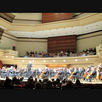Daniel Barenboim makes his highly anticipated return to Symphony Center
- Oct 30, 2018
- 5 min read

Just as music doesn’t have borders, there are personalities that are so huge and influential that they belong to the entire world. One of them is Daniel Barenboim, Chief Conductor of the Staatskapelle Berlin and former Music Director of the Chicago Symphony Orchestra. His talent, energy, professionalism and strong humanitarian views conquer audiences all over the globe and attract the attention of the world’s most prestigious orchestras and opera houses. Barenboim finds the best way to demonstrate the timeless masterpieces of classical music and makes our reality more beautiful, just, and elegant.
Chicago Symphony Orchestra is happy to announce the highly anticipated return of this acclaimed musician and conductor to Symphony Center for the first time since 2006. Barenboim will lead Chicago Symphony Orchestra in Smetana’s Má vlast in subscription concerts that will take place at 8 p.m. on Thursday, November 1, at 1:30 p.m. on Friday, November 2, and at 8 p.m. on Saturday, November 3. Barenboim will also lead the West-Eastern Divan Orchestra in a Symphony Center Presents special concert at 7:30 p.m. on Monday, November 5, which will launch a multi-city U.S. tour. This unique concert program will feature Iranian cellist Kian Soltani and Israeli violist Miriam Manasherov as soloists in Strauss’s Don Quixote, followed by a performance of Tchaikovsky’s Symphony No. 5.
Born in Buenos Aires in 1942, Barenboim demonstrated an outstanding musical talent at an early age. In 1952 his family moved to Israel, and soon after that his phenomenal skills were recognized by such influential individuals as Russian composer and conductor Igor Markevitch and German composer and conductor Wilhelm Furtwängler. Years of hard and tedious work, intense and thorough education, collaboration with the world-renowned musicians, and an unbelievable talent resulted in a worldwide career and global recognition. Since his 1967 conducting debut with the Philharmonia Orchestra in London, Barenboim has been in demand as a conductor at leading orchestras around the world and has been awarded many important prizes and honors. Named a United Nations Ambassador for Peace in 2007, Maestro Barenboim devotes all his life to promoting peace and tolerance through the means of music.
Barenboim has a deep and long-lasting relationship with the Chicago Symphony Orchestra. He served as chief conductor of the Chicago Symphony Orchestra from 1991 to June 2006, and in 2006 the musicians of the orchestra voted him honorary conductor for life. Now, the orchestra is thrilled to have Maestro Barenboim back at the Symphony Center and is ready to impress Chicago audiences with an outstanding concert program that will be performed during the first three days of November.
The composition that is chosen for this concert program inspires with its sincerity and deep meaning. It is the symphonic cycle called Má vlast (My Country) written by acclaimed Czech composer Bedřich Smetana, who is considered to be the father of Czech music. The cycle consists of six symphonic poems and portrays the rich history, distinct landscapes and vivid legends of the composer’s native country. The Chicago Symphony Orchestra will demonstrate the ideas that the composer originally put in the musical description of his motherland, yet it will be presented from the perspective of Maestro Barenboim who will add his own artistic touch into this timeless masterpiece. Barenboim has already presented Má vlast in his acclaimed performances with the Vienna Philharmonic and Staatskapelle Berlin in 2017.
The Chicago Symphony Orchestra has already performed symphonic poems from Smetana’s Má vlast throughout its history, but it will be the first time for the orchestra to perform all six symphonic poems together. Because of their interrelated nature and continuous musical thought, all six parts of Má vlast will be performed without intermission.
Unfortunately, when the composer started working on this cycle he began to lose his hearing and soon became totally deaf. However, it didn’t stop him from writing one of the best compositions of his life. Each symphony poem carries its own character and story. The first one is called Vysehrad, (The High Castle) and refers to the large castle along the Vltava River that marks the entrance to the city of Prague. It demonstrates the composer’s love to his motherland, heroic mood and pride in his country. The second symphony poem called Vltava (The Moldau) is considered to be the most popular of the whole set and is most frequently performed. Its vibrant and delicate melodic lines represent Bohemia’s mighty river and show its fast flow, natural beauty and eye catching sunlight reflections in the water.
The third symphonic poem demonstrates Sárka, the folk heroine and female warrior who rebels against male authority. Smetana finds interesting musical methods to show the war between Czech men and women that allegedly took place hundreds of years ago. The forth poem, Z českých (From Bohemia’s Fields and Groves), can be described as a “pastoral interlude” that portrays the calm and peaceful beauty of the Czech countryside. The history of the Hussite Rebellion, a 15-century movement dedicated to Bohemian independence, is demonstrated in the final two poems in the sets called Tábor and Blanik. At that time Tábor, the city south of Prague, was a rebellion stronghold, and the composer included musical material from a majestic Hussite chorale in his fifth symphonic poem. The last poem, Blanik, is named after a mountain where the Hussite warriors allegedly slept until they were called upon to defend their land. This poem ends with triumphant sounds of a victorious rise of the Czech state.
Another important event will take place at 7:30 p.m. on Monday, November 5, when Barenboim will return to Symphony Center to lead the West-Eastern Divan Orchestra in a concert that officially launches a multi-city U.S. tour. Being a philanthropist who puts a lot of effort to promote peace through music in the Middle East, in 1999 Barenboim along with the Palestinian literary scholar Edward Said founded the West-Eastern Divan Orchestra. This unique cultural and educational institution brings together young musicians from Israel, Palestine, and the Arab world and creates a unique musical collaboration demonstrating to the whole world that people of various nationalities can together create beautiful and inspiring projects and perform fabulous and moving music.
A philosophy of equality, cooperation and justice for all is the main idea of the West-Eastern Divan Orchestra that will start its Chicago performance with Strauss’s Don Quixote, described as “the richly orchestrated tone poem that includes a solo cello in the role of Don Quixote and a solo viola in the role of the knight-errant’s faithful companion Sancho Panza, with the orchestra depicting other characters and imagery from their many adventures.” Iranian cellist Kian Soltani and Israeli violist Miriam Manasherov will be featured soloists in Strauss’s Don Quixote.
The orchestra will also perform Tchaikovsky’s timeless Symphony No. 5 in E minor that was written and first performed in 1888. This composer’s mastership in showing human nature through the means of music is reflected in four movements of the symphony with a recurring main theme that is present in all four movements and declares “a complete resignation before fate, which is the same as the inscrutable predestination of fate.” However, its character keeps changing through the symphony and from sad and absolutely mournful it gradually transforms into triumphant and victorious.
With the help of the young musicians from the West-Eastern Divan Orchestra, Maestro Barenboim will demonstrate the spirit and the strength of the human soul that goes from darkness to light and from despair to love. This is the mission of this orchestra, of this concert program, of this tour, and of the life and heritage of Maestro Barenboim. With his highly anticipated return to Chicago, Barenboim will make another big step in enlightening this world with the great power of classical music, equity, peace and inner wisdom; wisdom that is part of every sound born under the baton of Daniel Barenboim.
Tickets and information can be obtained by calling 800-223-7114 or 312-294-3000, going online at https://cso.org, or at the Symphony Center box office located at 220 S. Michigan Avenue in Chicago.
Natalia Dagenhart
Photo: Courtesy of Holger Kettner

























Comments